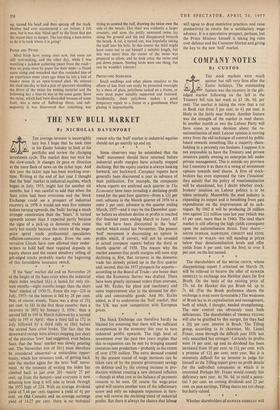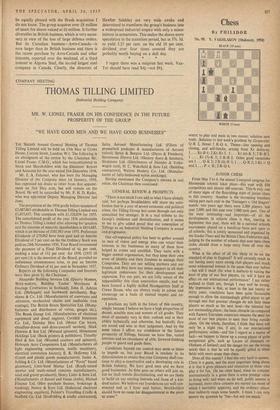COMPANY NOTES
By CUSTOS THE stock markets were much quieter but still very firm after the
• :* \ Easter holidays. The outstanding
feature was the recovery in the gilt- edged market following on the fall in the Treasury bill rate last week to £3 18s. 9d. per cent. The market is taking the view that a cut in Bank rate from 5 per cent. to 44 per cent, is likely in the fairly near future. Another feature was the strength of the market in steel shares. In another month or two the Labour Party will have come to some decision about the re- nationalisation of steel. Labour opinion is moving away from the old technique of control by public board towards something like a majority share- holding in a privately run business. I suppose it is not impossible to have the Treasury and private investors jointly owning an enterprise left under private management. This is outside my province but I mention it as there is a swing of investment opinion towards steel shares. A firm of stock- brokers has even expressed the view (intuition' they admit) that the policy of renationalisation will be abandoned, but I doubt whether stock- brokers' intuition on Labour politics is to be taken seriously. Meanwhile the steel industry is expanding its output and is benefiting from past expenditures on the improvement of its tech- niques. By 1962 it will be producing 28 million tons against 214 million tons last year (which was 63 per cent, more than in 1946). The steel share market is still offering the high yields consequent upon the nationalisation threat. Four shares— SOUTH DURHAM, HADF1ELDS, CONSETT and STEEL COMPANY OF WALES—are still standing at prices below their denationalisation levels and offer yields from 6 per cent. (on the first) to over 8 per cent, on the last named.
The shareholders of the BRUSH GROUP, whose disappointing report I criticised on March 29, will be relieved to receive the offer of HAWKER SIDDELEY 10 exchange one HaWker share for five Brush. On the basis of the existing price of 37s. 6d. for Hawker this put Brush 6d. up to 7s. 6d. (For the Brush preference shares the exchange is even more favourable.) The weakness of Brush lay in its capitalisation and management, both of which, I thought, needed strengthening. The new control can obviously meet both deficiencies. The shareholders of THOMAS TILLING will also be gratified by this merger, for they had a 204 per cent, interest in Brush. The Tilling group, according to its chairman, Mr. Lionel Fraser, came through the difficult year 1956 'not only unscathed but stronger.' Certainly its profits were 14 per cent, up and its dividend has been increased from 10 per cent. to 114 per cent, with a promise of 124 per cent, next year. But it is extremely difficult for an investor to judge for himself as the Tilling report gives no profit details for the individual companies in which it is interested. Perhaps Mr. Fraser would remedy this deficiency next year. At 50s. 6d. to yield a poten- tial 5 per cent, on coming dividends and 12 per cent, on past earnings, Tilling shares are not cheap but fairly valued.
Whether shareholders of HAWKER SIDDELEY will be equally pleased with the Brush acquisition I do not know. The group acquires over 1:8 million of assets for shares valued at £6 million. It further diversifies its British business, which is very neces- sary in view of the loss of large defence orders. But its Canadian business—Avro-Canada---is now larger than its British business and there is the recent purchase by Avro-Canada and other interests, reported over the weekend, of a third interest in Algoma Steel, the second largest steel company in Canada. Clearly, the directors of
Hawker Siddeley are very wide awake and determined to transform the group's business into a widespread industrial empire with only a minor interest in armaments. This makes the shares more speculative in the transition period, but at 37s. 3d. to yield 5.35 per cent, on the old 10 per cent. dividend, over four times covered they are probably worth buying on a dull day.
I regret there was a misprint last week. Van- Tor should have read $4/—not $9/.































 Previous page
Previous page